

|
Esteem and learning. Once our physiological needs, our need for safety and our need for love are being satisfied by our own efforts on a regular basis, we become more aware of a need for esteem. To obtain esteem we must be able to perform actions that are considered worthy of esteem. Even when very young our parents usually do not give us esteem automatically. We always have to earn esteem. What children desperately need to do is to learn how to obtain this esteem from others. Parents, are of course, in the unfortunate position of making it easy for children to learn how to obtain esteem or to make it difficult. 
Rite of passage. Many societies have a rite of
passage where children have to perform tasks to show
they are capable of being adult and so are judged adult
by their peers and elders. When they pass thru this
trial they gain the esteem of their peers and elders. In
the modern world ritualistic social trials no longer
exist but there are often trials that are not obvious
and hidden. In this day and age almost every group we
might belong to has its own hazing in which each person
must pass in order to belong. Two Needs. The need for esteem has two parts:
Of these the need for self esteem is far more important. However self esteem is almost entirely dependent on the esteem of others to be built up. Therefore in the end esteem like love cannot be satisfied directly for we must depend on others to satisfy that need for us. Our problem with esteem like that with love is to find ways to live our life and perform actions that will encourage others to supply our need. (In this case to hold us in high esteem.) The esteem of others. Almost anything we do well; a skill, a work of art, building a house or riding a bicycle contribute to the desire in others to to hold us in high esteem. But esteem is not only about cleverness and hard work, it is also about values. We admire and hold in high esteem not only those who are especially skilled or those who have undertaken colossal tasks but also those who are good and do good works. Indeed perhaps skills, works of art or great tasks also have to be judged worthy, of worth or worth doing. Thus esteem to some extent is always about value judgment. How good are actions are, how just our actions are, how truthful our actions are, how humerus our actions are, can all be measures other people use to judge us when deciding whether or not to hold us in high esteem. Our judgement of those judging us. Almost as important as the value judgments others make of us is the value judgments we make about those handing out the esteem. We value the praise or belief of others largely in direct proportion to how high in our own esteem we hold the others and their opinions. In other words we experience esteem mostly from those we hold in high esteem. Movie stars for instance are held in high esteem by millions of people, yet they probably experience esteem only from the praise, complements or being believed in by colleagues or peers.

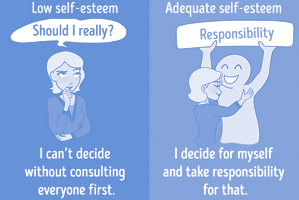
The pathology of power. The esteem in which we
hold others is very much the way in which we allow
others to dominate us. If we are held in high esteem we
tend to dominate others. But there is also another kind
of dominance which is obtained through fear. Certain
people have a kind of hunger to dominate others. Maslow
suggests that these are people who have been unable to
have their need for love satisfied on a regular basis
yet have somehow managed to move on to feeling the need
for esteem. What these people have is a need to dominate
or a need for power over others. They obtain this
dominance or power over others by making others fear
them. This need can become very strong as it tends to substitute for both the needs for love and esteem. However being a substitute it is never truly able to satisfied those needs and thus become the one all consuming need. Being not a real need no amount of dominance or power over others is truly satisfying and the accumulation of dominance or power leads only to the need for more dominance and power. People who fall into this pattern find they will never obtain love and esteem and are stuck at these levels unable to progress further toward self actualization. This is a very common pathological condition in our society that litters it with bullies. This is so much so that society is designed to accommodate such people and indeed it seems like it may fall apart without them. Climbing the hierarchy. Maslow not only devised his hierarchy of needs but also devised a theory of how humans moved from one level of need to another. He was of the opinion that satisfaction of needs at one level caused these to become less dominant, so elevating the person to the next level. He also felt that if needs were satisfied on a regular basis, they would become weaker as higher needs became the priority. Now while this is generally accepted, it appears as if Maslow has missed two important qualifications of this elevation. 1 Mutual support. Firstly, Maslow did not emphasize enough that needs often do not conflict and actually support one another. Clearly the need for esteem is not inconsistent with the higher meta needs. Whether we do things to gain the esteem of others or we do them to uphold justice or create beauty or simply to make a better world these needs are working together and one does not have to be less, so the other can be more. 2 Confidence. Secondly there is a different way of framing the conditions for weakening of needs. It is a more important intervening idea or condition for the weakening of a needs. The confidence of the person or organism in his/her ability to satisfy a need is what truly weakens a need. Needs only weaken when the person or organism is confident in his/hers ability to satisfy that need himself or herself. Otherwise it would logically follow that every time a need returned, it would return at a strength equal to its previous appearance. Needs do not return at full strength. Needs weaken, not as Maslow thought, because it was being satisfied on a regular basis, but rather, because the being involved was confident of his ability to satisfy that need him/herself whenever they needed to. 
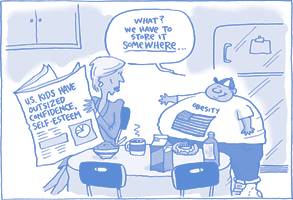 Two types of
confidence. The above is true however only for a
very unique kind of confidence. Carol Dweck and her
colleagues have pointed out that the confidence people
have in their competence and especially their competence
at gaining the esteem of others is not sufficient in
itself to enable true movement from one need level to
another. Inflated confidence. This is because of the way parents teachers and society has gone about trying to bolster children's confidence in the fairly recent past. It is not clear why this happened but at the end of the seventies and into the eighties there was a push to try and improve children's self confidence and self esteem in western countries. People went about this by telling almost the whole generation that they were special, intelligent and that they were doing good work even when they were doing it poorly. Further people were afraid to criticize these children in case it lowered their confidence and esteem. This empty praise created a generation who thought that it was there right to have a good life without much effort or hard work. On top of that it lowered the whole generation's self esteem instead of raising it. While they were usually fine while they were succeeding the moment they faced real obstacles they tended to fold. Even the mildest negative feedback could prick their puffed up false confidence and pop it like a balloon.  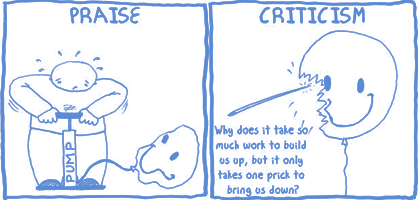 Solid confidence. Soon after this happened Carol Dweck came along and pointed out this kind of praise was exactly wrong to improve self esteem. She pointed out that, what is needed, is in fact, a more solid kind of confidence. She explained that what is needed is a confidence that is not about esteem being gained with minimal effort and persistence, but rather a confidence that embraces effort, persistence and hard work as being the very activities through which competence in any activity could be improved, and that this was key in gaining real esteem and through which self esteem could be increased. It was only through this that all cultivation of esteem is possible and which in turn creates true self esteem. Dweck puts it like this: "The confidence they need is the confidence that they, or any body for that matter can learn if they apply their effort and their strategies." "How can we as adults facilitate this kind of self-esteem? It won't come as news when I say, by emphasizing, challenges, effort, and strategies. We can show children how we relish a challenge by waxing enthusiastic when something is hard; we can talk about how good [accomplishing] an effortful task feels; we can model the exciting search for new strategies and report the information we have gleaned from the strategy that failed." From
deficiency to being needs. In his later life Maslow became
very concerned with a group of people who seemed to have
all their deficiency needs satisfied successfully and on
a regular basis yet seemed unable to make the last leap
to being needs. These people were unable to become
self-actualized. Maslow felt that there were two types
of people one life affirming and one non life affirming
and that the non life affirmers tended to get stuck at
the level of esteem even though they were held in high
esteem on a regular basis. Alternatively, however, this
failure to progress could have been a lack of confidence
in these people in their own ability to satisfy their
own esteem needs in the future despite currently having
the esteem of others. This site is not conversant with the cases Maslow had to draw on, but it is suspected, he may also be wrong about these people having their need for esteem regularly fulfilled/satisfied. Although, they may have been held in high esteem by many people, they may not have been held in high esteem by the people who's opinions they valued, and were thus not really having their need for esteem fulfilled at all. What is most essential for these people is the belief that they can, if they so wish, perform in such a way as to evoke esteem from others they hold in high esteem. To feel confident in doing this effectively they need to be learning and improving all the time, so that what they do tomorrow will always be better than what they did today. There may be many people, perhaps the majority of people, stuck at this level. THE ROLE OF PARENTS AND SOCIETY TO FACILITATE SATISFACTION OF ESTEEM NEEDS. Parents, society, and the institutions of society have a distinct and similar role to play in the satisfaction of people's esteem needs. The role of parents is to be a good parent and all that entails for the satisfaction of their children's esteem needs.
Conditional self esteem. Esteem should not be held to ransom. Like love esteem is dependent on others who will not bestow it on us unless we do something worthy of that esteem. Indeed while we are genetically programed to love our children unconditionally we are not so programmed to give esteem unconditionally. However, like love esteem should never be held to ransom. Parents have absolute power over their children, especially while the children are young, and can, if they desire, hold any of their needs to ransom. Some parents do hold their children's needs to ransom especially those needs for love and esteem. Parents who say 'you must get into a good college' may be implying that they will not love you if you do not not get into a good college. Even if they do not mean that, they almost certainly mean that they will not hold the child in high esteem if he/she does not get into a prestigious college.  The damage caused by conditional esteem. This is not good for a child's esteem because the action that gives rise to the esteem being given does not originate in the child and so the esteem seems lacking in worth itself. On top of that it may be something the child does not want to do and may thus gain no pleasure from doing it in that there will be no intrinsic reward as part of the experience. Further damaging, the child may feel they are being manipulated by the parent, and their sense of autonomy may also be depleted. Parents who give esteem only to manipulate can create in their children, a dependence on their approval for the child's esteem. In this way parents can hold their approval (the esteem in which they hold their children) to ransom. They withhold it unless the children comply with their wishes. Such a dependence may last throughout the child's life and never be truly satisfied. Children who have this inflicted on them, early in life, can thus become totally the pawns of their parents, who can thus manipulate them unmercifully. 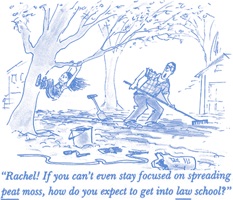
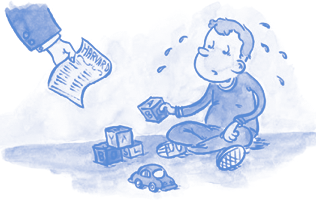 Only emitted behavior is held in high esteem. For the esteem, given by parents or care givers, to be properly effective, it should emerge naturally in response to the intentional autonomous behavior of the person/child. The moment the child is asked to do something that hints at esteem being withheld if it is not done, the esteem is being held to ransom. Of course, parents have to shape their children into an acceptable pattern of social behavior, but there is no need to make the esteem, normally given freely in response to children's accomplishments, conditional on a particular action. Socialization does not require the withdrawal of love or esteem if children do not comply. It simply means the care giver will be disappointed in them in the short term and while esteem will not be given in response to this one thing, it should not be withdrawn either. If it's not socialization it's manipulation. Regardless, most of the activities where esteem is withdrawn have nothing to do with socialization and everything to do with status and social climbing. It is an attempt, usually by a parent, to control the child's life or to live vicariously through them. There may develop a mutual dependence between the patent and the child a codependency if you will. While these parents will say this control is for the child's own good, and may even believe it, it does not make it so. This is an over protective or over bearing parent who can make a child's life dependent well beyond when they should be able to do everything themselves. This esteem, given only on condition, not only creates a dependence that never ends, but it also creates in the minds of children a desire to continually measure themselves against what there parents say about their worth. 
  Performance for others. This results in children going through life seeking the conditional esteem of their parents by performing for them and winning that esteem over and over again without ever truly satisfying the real need for esteem. Also eventually they become, to a lesser extent dependent, on the approval of anyone with whom they come in contact.  Clearly parents should refrain from making the esteem they give their children conditional. This withholding of esteem leads the child to wallow in self doubt and infer he/she is a failure undeserving of esteem. It will certainly prevent a child progressing beyond the need for esteem.  Learning
for others. This dependence also weakens the real
desire of children to expand their real knowledge.
Learning becomes all about the esteem of others. It
becomes a showing off of grades, of gaining certificates
and degrees, rather than expanding skills, competence
and understanding. Worse than that, it seems to develop
a kind self esteem that is itself dependent on what the
parents want. They end up like puppets dancing to the
tune the parents or teachers call. 
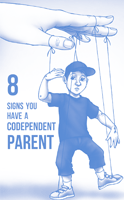
  While such children are succeeding, everything seems fine and it appears they are confident and have a high self esteem. But the moment that some difficulty appears, or even worse they fail at something, their confidence plummets like a stone and their self esteem is left in tatters.  Obstacles rather than being something to overcome become instead indications of their lack of ability and confirmation that many things simply cannot be done. The psychologist Carol Dweck would say that children subjected to this kind role model and parenting are most likely to develop a fixed mindset.  Challenge and incremental growth. Children, who got esteem freely from their parents whenever they did good things or when they did things well, are normally able to rise to challenges that those, who still wish to perform well for others, are incapable of. They can do this because they have less fear of failure and difficulty. They are more confident that they can improve through the application of effort and persistence. It is immaterial to them what others think so long as they can gauge incremental improvement in their own work, because they have built a mental model of what good or worthy work is. The inconsistency in the approval of parents and others who make approval conditional prevents the formation of this mental model of what it means to be good, do good work and be worthy of esteem. Praise and esteem. It is not enough to just know how not to provide your children with esteem. A good parent should be able to satisfy the esteem needs of those in their care while they are young and unable to satisfy their own esteem needs. This means knowing how to give praise in a way that does truly help satisfy esteem needs. Parents should be careful that, the praise, the expressions of delight, and the beliefs they confer on children are for actions of true worth, and more importantly, for actions the child has performed of his own volition and desire. It should not be just what the parent desires. Otherwise, as explained above, the esteem need is not really being satisfied but rather held to ransom. It also should not be false or undeserved praise meant to inflate egos. Giving praise that you do not believe does not prepare children for the real world. Instead it shelters them in an unreal bubble that eventually leaves them crippled when faced with the real world. 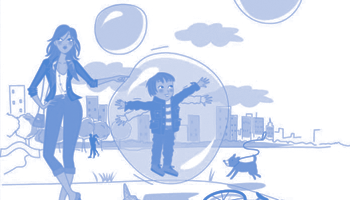
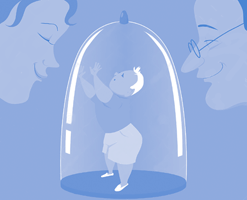 Self
theories and fortifying your children with esteem.
However, how praise is given is just as important as
when or what it is given for. It is true parents mostly
want to facilitate esteem and self-esteem in their
children and will try to do so through praise of or
expressions of delight in any action showing cleverness
and creativity. Unfortunately parents usually seem to
concentrate on telling their children what they are.
They say things like, "What a smart boy you are." or
"What a clever girl you are." or You're so artistic
(creative). Children quickly learn to work for this
praise or expressions of delight as is seen where
children are constantly showing their parents what they
can do and what they have done. This kind of praise
however, has some unfortunate side effects, in that
while it bolsters esteem in the short term it has a
negative effect on self-esteem in the long run because
it does not motivate them to improve.This leaves them
with the absurdly incorrect crushing idea that things do
not and cannot change. 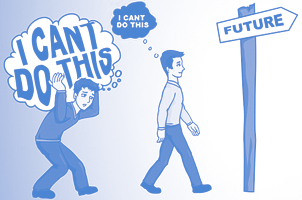
 Fixed Mindset. The trouble is that praise of the sort that informs children that they are beautiful, good, intelligent, talented etc. tends to focus children's minds on 'what their abilities are at that moment' fixing their view of their abilities then and forever as unchangingly frozen into whatever that judgment was. This in turn provides a standard to live up to. It is a standard which needs to be demonstrated often and well yet has no way of being lived up to. Children seeing the world through this lens are forced to discard the very tools that might enable it being lived up to, because change becomes overly difficult. This is what Carol Dweck calls a 'fixed mindset' or an "entity self theory". In her book "Self-theories" she explains it as follows: "These practices also come from a limited view of how self-esteem is instilled. It is often portrayed as something we give to to children by telling them they have a host of good things inside them, like high intelligence. These beliefs lead us as adults to lie to children - to exaggerate positives, to sugar coat negatives, or to hide negative information entirely. We fear that negative information or criticism will damage self-esteem. It is as though we've bought into the entity theory, [fixed mindset] in which children require constant success to feel good about themselves and in which failures send a negative message about intelligence and worth. We are in fact operating within theory when we attempt to puff children up and boost their egos instead of boosting their effort, when we try to hide their deficiencies instead of helping them overcome them, and when we try to eliminate obstacles instead of teaching them how to cope with them. These practices also convey an entity theory of intelligence to our children. They tell them that having intelligence is the most important thing, and that not having it is so shameful that errors and deficiencies need to be hidden from them. This kind of treatment may 'work' in some ways. Telling children they're smart and giving them constant successes may in fact make them feel good and it may instill a kind of worth - the kind we call entitlement. We may be teaching them to feel entitled to a life of easy success and lavish praise for minor efforts (Damon, 1995; Seligman et al., 1995). They may feel entitled to all that society has to offer without putting in the effort to earn it, for when were they are taught that anything that required effort? This kind of self-esteem is not what our students need and is not what society needs. Moreover, it's a recipe for anger, bitterness, and self doubt when the world does not fall over itself trying to make them feel good the way their parents and teachers did, or when the world does not accept them quite as they are, or when the world makes harsh demands before it gives up it's rewards (see e.g., Bushman & Baumeister, 1998). And what about setbacks, failures, and rejections - all the things that precede success in the real world? How can they know what to do with these?"
In the Calvin and Hobbs cartoons above and below we are given a clear idea of how fixed mindset people tend to think about esteem and try, using self defeating strategies, to protect themselves from those circumstances that would diminish that esteem. Of course they may be much less aware of what they are doing than Calvin is.  Simon Sinek. The famous business guru Simon Sinek explains it like this. He says there is a group of young people who have recently entered the work force called "millennials". He says these young people have been accused of being unfocused, narcissistic, entitled, self interested and lazy. However he does not believe that this is the fault of those young people. Instead he believes that they are the result of failed parenting strategies.  These are in fact the same parenting strategies referred to above and which Carol Dweck believes create a fixed mindset. Sinek explains further that they were brought up being told that they were special over and over and they were told that they can have anything they want in life just because they want it. They often got participation awards even if they came in last and often their parents bought or nagged teachers to pass them through the school system and even got them jobs. 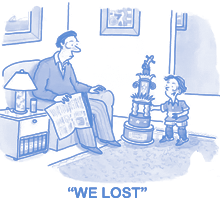
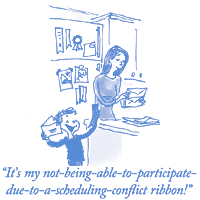
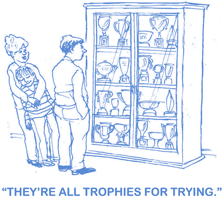 Ultimately, however, they are thrust into the real world and in an instant they find out they are not special, their moms cant get them a promotion, they get nothing for coming in last and that you can't have it just because you want it. By trying to bolster their children's self esteem these parents have created a generation of youths with low or unrealistic self esteem and low skill sets. 
  Growth Mindset. If parents are willing to praise children a little differently they will be able to focus the children's minds on how things change and in particular on how they are able to change for the better. If instead of praising what children are, we can instead praise how they have improved, how hard they have worked, or how much effort they have made, parents can provide children with a mindset that encourages continuous expansion of skills toward unlimited ends . Parents who say things like, "Wow you have really put a lot of work into that" or "Your so much faster than you were just a few day ago." are giving their children an edge. This will enable them to change continuously and easily and thus continue to learn and build new skills. Thus they will be able to provide works and actions that make them worthy of having esteem bestowed on them. This is a 'growth mindset'. In her book "self-theories" Carol Dweck explains further: "Moreover in an incremental framework, [a growth mindset] what feeds your esteem - meeting challenges with high effort and using your abilities to help others - is also what makes for a productive and constructive life. ...Within an incremental framework, we give student's an honest choice. If they want to get ahead they have to put in what it takes. But we also have to be prepared to facilitate them in learning what it takes. 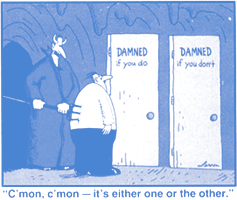
 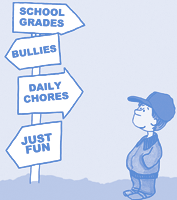 ...Another more fruitful, view is that self-esteem is something students experience when they engage in something fully and use their resources fully, as when striving to master something new. It is not an object we can hand them on a silver platter, but it is something we can facilitate, and by doing so we we help ensure that challenge and effort are things that enhance self-esteem, not threats to the ego." 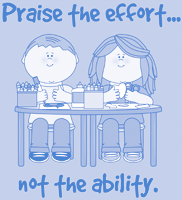
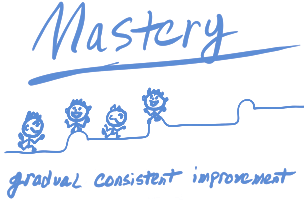 Other praise positive feedback. Praise of the child's work will be less damaging than praise of the person. But praise of work still draws attention to current talents. It is however, necessary to provide children with feedback both negative and positive. In fact both negative and positive feedback are essential in alerting children to the fact they are moving in the right direction, and the positive kind has been shown to increase children's intrinsic motivation and also help children feel they deserve to be held in high esteem. Praising the work provides children with information about what others like and what is held by peers and significant others to be worthy of praise. (Significant other are those people the child holds in high esteem and thus who's opinions the the child values.) This positive feedback needs to be given in a form that promotes a growth mindset not a fixed one. Saying things like, "I liked the color and intensity in that work. It shows great improvement over your previous efforts." or "That's beautiful work. You have really mastered this technique since I last saw your work." or "You played a fantastic game today. Your new strategy was well thought out." are good ways to shore up children's esteem. This kind of praise is specific (telling them how the work was good). Or the strategies used in the work can be praised rather than the work itself (telling them what was good about how they went about the work). Or the present work may be simply compared with some past work (telling them how much the new work is better than that past work). There are many ways to praise that lead to a growth mindset. You can praise effort, hard work, strategies and improvement. For more on this see the self-theories page. Letting
go. However, and more importantly, the main
parental role is not to give approval or esteem directly
to children nor is it to bolster their self esteem with
praise. It is rather to act as facilitators in enabling
those in their care to learn the skills that are needed
to satisfy their own self esteem needs. Not only that,
but a good parent should be able to perceive when the
child needs to try to do it by himself, when only advice
is needed, and when the child no longer needs any help
at all. The good parent should want for the child to
learn how to satisfy his own esteem needs and take pride
in how he/she is able to gain the esteem of others. The
parent's main role in later childhood should be in
facilitating the learning of those skills necessary to
earn the approval/esteem of others instead of parental
approval. Also a good parent has to realize that his or
her children know far better when esteem needs need to
be satisfied by the child him or herself. The parent
should be constantly scanning for signs that the child
might need help in satisfying the need for esteem but
more importantly should also be scanning for clues that
the child does not want or need help in satisfying
esteem. The parent needs to know when to hold on to the
child and give esteem support and when to let go. Breaking free. In the end parents/care givers have to let go completely as the child should eventually be so secure in his/her self esteem that it no longer requires the external input of praise, approval or any other kind of validation. In that state the child can maintain his own self esteem by judging the worth and quality of his/her own actions. When they can do this they are no longer dependent on anyone for esteem. They can cut the cord or break free. 

 Continued attachment. While it is important for every level of need that a transition of the child from dependence to independence take place smoothly it is essential for esteem as this is the last of the dependent needs. This is where a child should become truly independent of their parents. It is also where, especially with mothers, it can go very wrong where parents continue to give help and support when no help should be necessary. Children can remain dependent and infantile and where parents (usually mothers) remain firmly attached.  And so with society. If this is true for the good parent surely it should also be true for society and the institutions of society. Society and its institutions should supply our esteem needs in the same manner as advocated for parents above. They should supply them directly when we are young or when we are otherwise helpless to supply them ourselves. More importantly, however, they should strive to enable us to learn the skills we need to satisfy our own esteem needs by competently evoking esteem responses from others, and facilitating our abilities to judge correctly the worth of our own actions. Also they should be aware that we always know best when esteem needs are currently dominating our motivation and thus when these needs are to be satisfied. With regard to the need for esteem it becomes clear in the early stages of life that praise of accomplishment, praise of effort and improvement and praise of the actualization of potential is essential. It is also essential that good and worthy attributes are admired and approved of rather than power and one-up-man-ship. Since the only skills needed to gain the esteem of others are the skills of accomplishment, creation and the actualization of ones potential we would expect early encouragement of these skills would make them a strong part of our repertoire of skills in later life. Likewise early encouragement of good and worthy works should ensure their existence and proliferation in later life. |
Needs
Interest Method
Reality Keys
How to Help Creative
Genius Future What
is Wrong Theories Plus
Thin Slicing Expertise
Self Determination Answers
Iteration
 The
need for esteem and self esteem.
The
need for esteem and self esteem.  Self esteem. If we have good self
esteem we do not need the esteem of others. It seems
like we can supply ourselves with esteem if we really
believe in ourselves. But this is a catch 22, for the
only known way to obtain self esteem is to be supplied
with the esteem of others on a regular basis and to feel
confident that we have the ability influence others to
supply us with esteem on a regular basis. This is, of
course, consistent with all other needs. Perhaps a
person well loved who is confident in his ability to win
the love of others can be sustained by self love if the
love of others is removed. We can of course improve our
self esteem by changing the interpretation we put on our
actions. We can try to see our own actions as successes
not failures as worthy not unworthy as competent not
incompetent. We can program ourselves with positive
thoughts and self talk but this is incredibly difficult
to do without the esteem of others, unless you have had
it regularly for a long time previously. Similarly we
can also change our interpretation of the actions of
others. How we see the actions of others is essential to
whether we see it as validating our self worth or not,
and it can easily be misunderstood.
Self esteem. If we have good self
esteem we do not need the esteem of others. It seems
like we can supply ourselves with esteem if we really
believe in ourselves. But this is a catch 22, for the
only known way to obtain self esteem is to be supplied
with the esteem of others on a regular basis and to feel
confident that we have the ability influence others to
supply us with esteem on a regular basis. This is, of
course, consistent with all other needs. Perhaps a
person well loved who is confident in his ability to win
the love of others can be sustained by self love if the
love of others is removed. We can of course improve our
self esteem by changing the interpretation we put on our
actions. We can try to see our own actions as successes
not failures as worthy not unworthy as competent not
incompetent. We can program ourselves with positive
thoughts and self talk but this is incredibly difficult
to do without the esteem of others, unless you have had
it regularly for a long time previously. Similarly we
can also change our interpretation of the actions of
others. How we see the actions of others is essential to
whether we see it as validating our self worth or not,
and it can easily be misunderstood.
